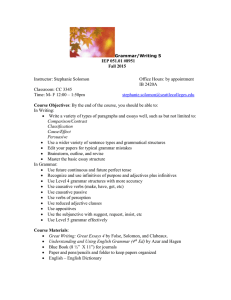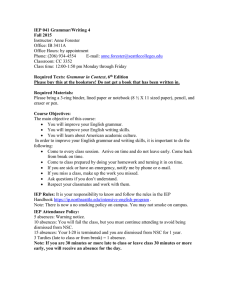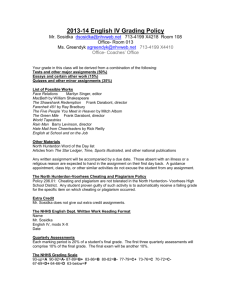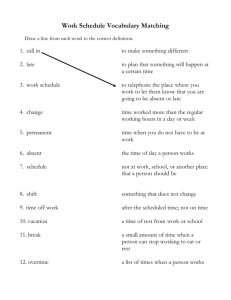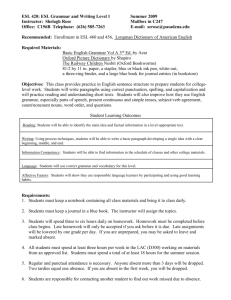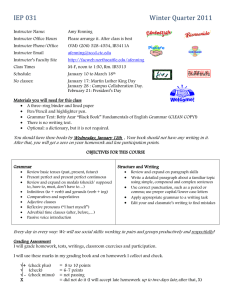Syllabus for IEP 041.03 Grammar/Writing 4, #8947 Spring 2016 Instructor
advertisement
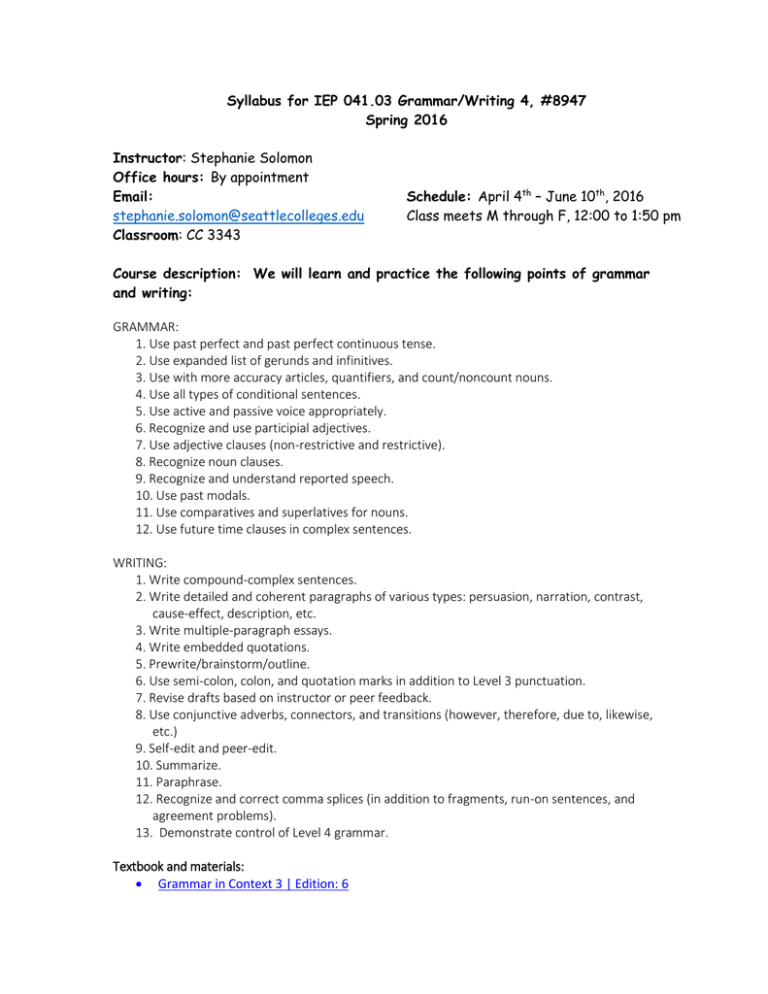
Syllabus for IEP 041.03 Grammar/Writing 4, #8947 Spring 2016 Instructor: Stephanie Solomon Office hours: By appointment Email: stephanie.solomon@seattlecolleges.edu Classroom: CC 3343 Schedule: April 4th – June 10th, 2016 Class meets M through F, 12:00 to 1:50 pm Course description: We will learn and practice the following points of grammar and writing: GRAMMAR: 1. Use past perfect and past perfect continuous tense. 2. Use expanded list of gerunds and infinitives. 3. Use with more accuracy articles, quantifiers, and count/noncount nouns. 4. Use all types of conditional sentences. 5. Use active and passive voice appropriately. 6. Recognize and use participial adjectives. 7. Use adjective clauses (non-restrictive and restrictive). 8. Recognize noun clauses. 9. Recognize and understand reported speech. 10. Use past modals. 11. Use comparatives and superlatives for nouns. 12. Use future time clauses in complex sentences. WRITING: 1. Write compound-complex sentences. 2. Write detailed and coherent paragraphs of various types: persuasion, narration, contrast, cause-effect, description, etc. 3. Write multiple-paragraph essays. 4. Write embedded quotations. 5. Prewrite/brainstorm/outline. 6. Use semi-colon, colon, and quotation marks in addition to Level 3 punctuation. 7. Revise drafts based on instructor or peer feedback. 8. Use conjunctive adverbs, connectors, and transitions (however, therefore, due to, likewise, etc.) 9. Self-edit and peer-edit. 10. Summarize. 11. Paraphrase. 12. Recognize and correct comma splices (in addition to fragments, run-on sentences, and agreement problems). 13. Demonstrate control of Level 4 grammar. Textbook and materials: Grammar in Context 3 | Edition: 6 Author: Sandra N. Elbaum ISBN: 9781305075399 Publisher: Cengage Learning Writing to Communicate 2 Author: Cynthia A Boardman, Jia Frydenberg Publisher: Pearson A 3-ring binder for organizing your paper and handouts Paper, pens, pencils, and eraser American Classroom Rules and Expectations: Come to class on time and return from breaks on time Speak English only in the classroom Get everything done during the break. Do not leave the classroom while the class is in session Show respect your classmates and instructor – do not talk over other students or while the instructor is speaking Turn assignments in on time. I will accept it one day late -10%, or Monday if due Friday -20%. After that it is a zero. Cell phones must be put away in bags or jacket pockets unless you are given permission by the instructor Check CANVAS daily for assignments and due dates Participation: This means to ask questions, offer answers, and work with partners or groups. It is very important for you to be prepared and active during each class. If you don’t actively participate or you don’t do your homework assignments outside of class, you will not pass. You get 2 points per day for participation. You lose points if: 1. 2. 3. 4. you are absent (2pts) you are late (1) You do not have your hw or book (1) If I have to repeatedly ask you to speak English (1) Course grading: Students must have a minimum of 75% in grammar and writing in order to pass this class. Every week, you will take one grammar test and one writing test. If you are absent the day of the test, your grade is 0. I do not generally give makeup tests; however, I do drop your lowest score in each category. Assignments and participation: 25% Weekly grammar tests: 25% (drop lowest score) Weekly writing tests: 25% (drop lowest score) Final grammar/writing tests: 25% (combined) GRADE SCALE: 96 to 100% 4 .0 …. 84% 2.9 …. 74% 1.9 94-95% 3.9 83% 2.8 73% 1.8 93% 3.8 82% 2.7 72% 1.7 92% 3.7 81% 2.6 71% 1.6 91% 3.6 80% 2.5 70% 1.5 90% 3.5 79% 2.4 69% 1.4 89% 3.4 78% 2.3 68% 1.3 88% 3.3 77% 2.2 67% 1.2 87% 3.2 76% 2.1 <66% 1.0 86% 3.1 75% 2.0 65% 1.0 85% 3.0 Below 75% No pass 64% 1.0 <63%* 1.0 *all grades below 66% receive a 1.0 End of the Quarter Grade: 90% or more = High pass 80-89% = Pass 75-79% = Low pass 74% and below = Fail Late homework assignments: Homework is due at the beginning of class. If you are absent on the day that a homework assignment is due, you may turn it in on the day you return. However, if you have not been absent and you miss a homework assignment, you will -10%, -20% or a zero for that HW. Moving to the Next Level: Students must pass both grammar/writing and reading/vocabulary classes to move up a level in both classes. If they fail either class, they must repeat both classes in the next quarter. If students pass Listening/Speaking, they move to the next level in Listening/Speaking. IEP Failure to Make Academic Progress Policy: According to U.S. F-1 visa rules, students who fail to make satisfactory academic progress will be dismissed from the program and will need to transfer to a different school or leave the U.S. They will be considered out of status by the U.S. Department of Homeland Security. “Failing to make satisfactory progress” means the following: You have failed one class two times, or you did not attend a class regularly (see attendance policy). Other Important Info!: 1) If you are absent, call a classmate for homework or check CANVAS! 2) Ask questions if you don’t understand. 3) Keep your phone on silent and use ONLY when the teacher asks. 4) Come to class prepared. Do homework before the class. Print assignments before class – you do not have time to print during the break! IEP Attendance Policy: If you are absent from class 5 times, you will receive a warning. If you are absent 10 times, you will fail the class, but you must continue attending to avoid being dismissed from NSC. If you are absent 15 times, your I-20 will be terminated and you will be dismissed from NSC for 1 year. Please be ready to work when class starts at 12:00. Students who arrive more than 5 minutes late will be marked tardy. Students who have been marked tardy 3 times or come to class more than 30 minutes late will be marked absent. You will also be marked absent if you leave class more than 30 minutes early. IEP Repeat Policy: IEP students are allowed to repeat a class one time. If a student fails a class a second time, he or she will be dismissed from the program. The Page One Writing Center is a place to get help with all English skills. GENERAL STUDENT RESPONSIBILITIES, BEHAVIORAL EXPECTATIONS, AND CONSEQUENCES OF NONCOMPLIANCE: 1. Bring your textbook every day. Not purchasing your books or not bringing your books to class will hurt your grades and limit your ability to fully participate, learn, and make academic progress in your classes. Noncompliance: If you come to class three times without your required text, your teacher may ask you to leave the class and not return until you have a textbook. This will count as an absence. 2. Cell phones and other electronic devices may only be used during class time with instructor permission. Texting, listening to music, surfing, shopping, and talking on the phone during class is disruptive and considered extremely rude. During a test, no electronic device is allowed on your desk without teacher permission. Noncompliance: If you use your cell phone three times during a class session without teacher permission, you will be told to leave the class and you will receive an absence for the day. 3. Show respect to those around you while in class and on campus. This means the following: a. Do not sleep in class, talk while the teacher or another student is talking, or laugh at/criticize other students when they make mistakes. b. Do not bring food or drinks to class unless your instructor approves it. c. “North Seattle Community College is a ‘no-smoking campus,’ except in designated areas. Smoking is permitted in posted areas only. Noncompliance: When a teacher has spoken to you about any of the above and you refuse to comply or you comply each time, but then repeat the action three times, you will be asked to leave and you will receive an absence for the day. ACADEMIC HONESTY: Students are expected to be honest in taking their tests and doing their coursework. There are two kinds of academic dishonesty: CHEATING and PLAGIARISM. Here in the U.S., both are unacceptable and considered serious academic crimes. Academic dishonesty may cause you to fail your classes, be dismissed from the program, or be dismissed from NSC. ALWAYS do your own work. Cheating is copying homework or a class assignment or test from another person and pretending it is your own work or having another student verbally tell you the answer. Cheating is also allowing someone else to copy from you, or providing answers to an assignment or test to someone else. If students are caught cheating, you will get a failing grade for the assignment or test and could be dismissed from the program Plagiarism is when you copy or memorize ideas or text from a friend, relative, or classmate or from a book, magazine, newspaper, live/recorded lecture or the Internet and pretend it is your own work. This is dishonest and is considered the same as cheating. Plagiarism can result in failure and dismissal from the program. It is easily discovered and will result in failure on the assignment and potentially failing the course. When you write a journal, summary, or an essay, or give an oral presentation, both the choice of words and the grammatical structure must be your own. Class contacts: write the names of two people you can call if you have questions about the class or homework. Name: _______________________________________ Phone: ____________________ Name: _______________________________________ Phone: ____________________ IEP Rules: It is your responsibility to know and follow the rules in the IEP Handbook - https://ip.northseattle.edu/intensive-english-program. Disability Information: In my commitment to student learning, I want to support all students. If you have a disability that will affect your performance in this class, please let me know [see my email and phone # on page one of this syllabus.] Students with disabilities are encouraged to use Disability Services for support in implementing reasonable accommodations for their disabilities. You may make an appointment with Disability Services by calling 934-3697 or stopping by the DS office on the 2nd floor of the Campus Center (CC2346A).
